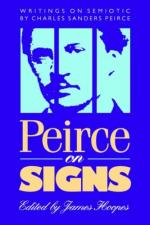|
This section contains 4,328 words (approx. 15 pages at 300 words per page) |

|
SOURCE: "Realism and Idealism in Peirce's Cosmogony," in International Philosophical Quarterly, Vol. XXXII, No. 126, June, 1992, pp. 185-92.
In the following excerpt, Anderson explores the potential contradictions in Peirce's religious faith and his pragmatic convictions.
That Charles Peirce was a realist in several ways is hardly disputable; the body of work that discusses Peirce's realisms is already large and is growing steadily.1 We know, for example, that Peirce embraced an epistemological realism displaying contempt for concern for that which is "absolutely incognizable" (CP 5.312).2 At the same time, and perhaps more significantly, he defended a Scotistic realism that asserted the reality of generals, that is, of ideas. On the other hand, we also know that Peirce often described his metaphysics as, in part, "objective idealism" (CP 6.24, 6.163)3; he believed matter to be "a specialization of mind" (CP 6.268). Peirce's testimony is borne out by a number of similarities his writings share with...
|
This section contains 4,328 words (approx. 15 pages at 300 words per page) |

|


